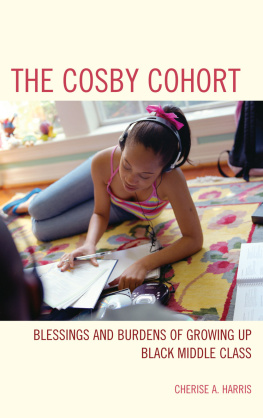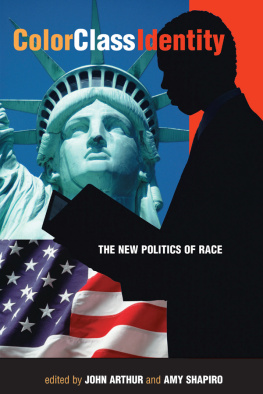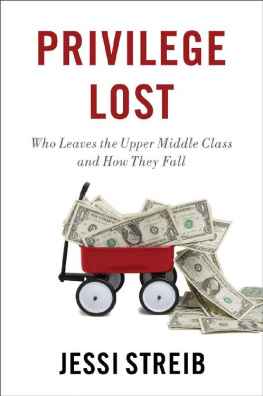The Cosby Cohort
Perspectives on a Multiracial America series
Joe R. Feagin, Texas A&M University, series editor
The racial composition of the United States is rapidly changing. Books in the series will explore various aspects of the coming multiracial society, one in which European Americans are no longer the majority and where issues of white-on-black racism have been joined by many other challenges to white dominance.
Melanie Bush, Breaking the Code of Good Intentions
Amir Mavasti and Karyn McKinney, Middle Eastern Lives in America
Richard Rees, Shades of Difference: A History of Ethnicity in America
Katheryn Russell-Brown, Protecting Our Own: Race, Crime, and African Americans
Elizabeth M. Aranda, Emotional Bridges to Puerto Rico: Migration, Return Migration, and the Struggles of Incorporation
Victoria Kaplan, Structural Inequality: Black Architects in the United States
Angela J. Hattery, David G. Embrick, and Earl Smith, Globalization and America: Race, Human Rights, and Inequality
Pamela Anne Quiroz, Adoption in a Color-Blind Society
Adia Harvey Wingfield, Doing Business with Beauty: Black Women, Hair Salons, and the Racial Enclave Economy
Erica Chito Childs, Fade to Black and White: Interracial Images in Popular Culture
Jessie Daniels, Cyber Racism: White Supremacy Online and the New Attack on Civil Rights
Teun A. van Dijk, Racism and Discourse in Latin America
David J. Leonard and C. Richard King, Commodified and Criminalized: New Racism and African Americans in Contemporary Sports
Melanie E. L. Bush, Everyday Forms of Whiteness: Understanding Race in a Post-Racial World , 2nd edition
Noel A. Cazenave, The Urban Racial State: Managing Race Relations in American Cities
Maria Chvez, Everyday Injustice: Latino Professionals and Racism
C. Richard King, Carmen R. Lugo-Lugo, and Mary K. Bloodsworth-Lugo, Animating Difference: Race, Gender, and Sexuality in Contemporary Films for Children
Cherise A. Harris, The Cosby Cohort: Blessings and Burdens of Growing Up Black Middle Class
The Cosby Cohort
Blessings and Burdens of Growing Up Black Middle Class
Cherise A. Harris
Rowman & Littlefield Publishers, inc.
Lanham Boulder New York Toronto Plymouth, UK
Published by Rowman & Littlefield Publishers, Inc.
A wholly owned subsidiary of The Rowman & Littlefield Publishing Group, Inc.
4501 Forbes Boulevard, Suite 200, Lanham, Maryland 20706
www.rowman.com
10 Thornbury Road, Plymouth PL6 7PP, United Kingdom
Copyright 2013 by Rowman & Littlefield Publishers, Inc.
All rights reserved . No part of this book may be reproduced in any form or by any electronic or mechanical means, including information storage and retrieval systems, without written permission from the publisher, except by a reviewer who may quote passages in a review.
British Library Cataloguing in Publication Information Available
Library of Congress Cataloging-in-Publication Data
Harris, Cherise A., 1976
The Cosby cohort : Blessings and burdens of growing up black middle class / Cherise A. Harris.
p. cm. (Perspectives on a multiracial america series)
Includes bibliographical references and index.
ISBN 978-1-4422-1765-2 (cloth : alk. paper) ISBN 978-1-4422-1767-6 (ebook : alk. paper) 1. African AmericansSocial conditions1975 2. Middle classUnited States. 3. BlacksRace identity. I. Title.
E185.86.H357 2013
305.896'073dc23
2012046654
 The paper used in this publication meets the minimum requirements of American National Standard for Information SciencesPermanence of Paper for Printed Library Materials, ANSI/NISO Z39.48-1992.
The paper used in this publication meets the minimum requirements of American National Standard for Information SciencesPermanence of Paper for Printed Library Materials, ANSI/NISO Z39.48-1992.
Printed in the United States of America

Preface
Millions of blacks woke up on November 5 [2008] with yet another buppie made better off on their backs while they remain jobless in dangerous neighborhoods, their immediate futures no brighter for knowing that cornbread may start appearing at the White House Thanksgiving table. When we all stop weepily singing We Are the World and emailing each other about what Great-Aunt Bessie would say now if she werent dead, well find that race is still a festering wound. (Debra J. Dickerson, Class is the New Black: How I Had to Look Beyond Race and Learn to Love Equality. Mother Jonas , January 16, 2009)
The election of Americas first Black president proved a watershed moment in American history and reignited old debates about the nature of Blackness. While public discourse continually noted the level of racial progress that must have transpired in order to have a viable Black candidate in the race, Barack Obama faced an abundance of questions that were variations on the same theme: Is he Black enough? All of a sudden, a discussion about racial identity that had been largely confined to Black beauty salons, high school cafeterias, and Sunday dinners became part of the national discourse. In large part, the questions about Obamas Blackness arose in response to his biracial heritage and unique upbringing, where certain critics questioned whether a black man raised by a white mother and grandparents in Hawaii and Indonesia truly understood the African American experience (Joseph 2010, 183). Yet, as journalist Debra Dickersons statement above suggests, the question was broader than that. It was a question about social classabout the buppie middle-class attitude toward their working-class and low-income counterparts.
As a graduate of Harvard University, professor of constitutional law at the University of Chicago, and a senator at the young age of forty-three, Obama is emblematic of the success enjoyed by a generation of middle-class (and even upper-middle class) Blacks who have faced fewer prohibitive racial barriers than their progenitors. In an allusion to biblical text, Jesse Jackson Sr. refers to them as the post-Joshua generation or the generation that was able to pass through and become successful after Joshua led Moses (i.e., Martin Luther Kings) followers into the Promised Land (Cose 2011). Historian Peniel Joseph (2010) offers important insight into Obama and his generation:
In large measure, Obama has enjoyed the benefits of both the civil rights and Black Power movements while maintaining a safe distance from both. At forty-eight, he is too young to have marched in civil rights demonstrations or participated in Black Power-era campus protests. Instead, Barack Obama came of political age in the late 1970s and early 1980s in an arid political desert of social change. Though there were ongoing movements to protect Affirmative Action, end apartheid, and stave back Reagan-era economic cuts, this was a time when the left and the black movement in general reacted to, rather than set, Americas social and political agenda. (195)
Essentially, the activities of postcivil rights Blacks stand in stark contrast to the generations before them, in part because of the more acute and overt forms of racism during the Jim Crow era, which necessitated a large-scale protest movement. Comparatively speaking, the formative years of postcivil rights Blacks have been marked by a quieter political tone where issues of race have been concerned, and it was within this context that upwardly mobile Blacks like Obama and others of his generation have been able to flourish.
Barack Obama represents a small, highly educated and powerful segment of the postcivil rights Black middle class but one that is often accused of being disconnected fromor, at the very least, ambivalent towardthe rest of Black America. Wingfield and Feagin (2010) suggest as much about Obama when they note that prior to his first presidential race, he was largely absent from the Black political scene:






 The paper used in this publication meets the minimum requirements of American National Standard for Information SciencesPermanence of Paper for Printed Library Materials, ANSI/NISO Z39.48-1992.
The paper used in this publication meets the minimum requirements of American National Standard for Information SciencesPermanence of Paper for Printed Library Materials, ANSI/NISO Z39.48-1992.